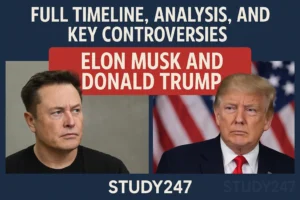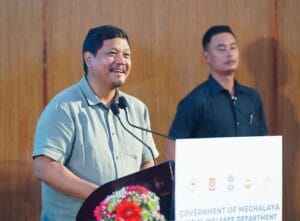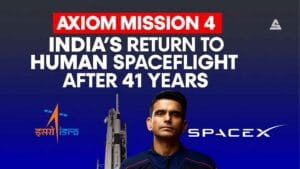Citizenship is the status of a person recognized under law as being a legal member of a sovereign state or belonging to a nation. In India, Articles 5 – 11 of the Constitution deals with the concept of citizenship. The term citizenship entails the enjoyment of full membership of any State in which a citizen has civil and political rights
Top 50 MCQs on Citizenship for all competitive Exam like UPSC, SSC, TPSC Etc.
1. Which of the following is not a condition for becoming a citizen of India?
- A). Birth
- B). Acquiring Property
- C). Descent
- D). Naturalisation
Correct Answer: Acquiring Property
2. Who is competent to prescribe conditions for acquiring Indian citizenship?
- A). Parliament
- B). State Legislature
- C). President
- D). Attorney General
Correct Answer: Parliament
3. According to the Citizenship Act, 1955, Indian citizenship cannot be acquired by:
- A). Children of the diplomatic personnel or alien enemies born in India on or after 26th January 1950
- B). Children born of Indian citizens abroad
- C). Incorporation of territory not forming part of India at the commencement of the Constitution
- D). Naturalisation
Correct Answer: Children of the diplomatic personnel or alien enemies born in India on or after 26th January 1950
4. Citizenship provisions are enshrined in the Constitution in:
- A). Part II
- B). Part II, Articles 5-11
- C). Part II, Articles 5-6
- D). Part I, Articles 5-11
Correct Answer: Part II, Articles 5-11
5. Which of the following Articles describes a person voluntarily acquiring citizenship of a foreign state not to be citizens?
- A). Article 5
- B). Article 7
- C). Article 8
- D). Article 9
Correct Answer: Article 9
6. Details on how citizenship may be acquired and terminated are enumerated in:
- A). Part II of the Constitution
- B). The Citizenship Act, 1955
- C). Schedule I of the Constitution
- D). Various enactments by Parliament
Correct Answer: The Citizenship Act, 1955
7. A person can become a citizen of India even if born outside India if his/her:
- A). Father is a citizen of India
- B). Mother is a citizen of India
- C). Father is a citizen of India at the time of the person's birth
- D). Father or mother is a citizen of India at the time of the person's birth
Correct Answer: The father or mother is a citizen of India at the time of the person's birth
8. To acquire citizenship by registration, a person must have been resident in India for how many years immediately before making an application?
- A). Six months
- B). One year
- C). Three years
- D). Five years
Correct Answer: Five years
9. If an Indian citizen is denied a public office because of his religion, which of the following fundamental rights is denied to him?
- A). Right to Freedom
- B). Right to Equality
- C). Right to Freedom of Religion
- D). Right against Exploitation
Correct Answer: Right to Equality
10. Fundamental Freedoms under Article 19 are suspended during emergencies caused by:
- A). War of external aggression
- B). Failure of constitutional machinery of a state
- C). Internal armed rebellion
- D). Financial crisis
Correct Answer: War of external aggression
11. Citizenship cannot be terminated when:
- A). There is an emergency
- B). There is war
- C). There are elections
- D). It can be terminated regardless of conditions
Correct Answer: When it can be terminated regardless of conditions
12. Which country accepted the policy of Dual Citizenship?
- A). India
- B). Canada
- C). Australia
- D). USA
Correct Answer: USA
13. A citizen acquiring citizenship through naturalisation:
- A). May belong to any country without qualification
- B). May keep the citizenship of any other country
- C). Must either reside in India or serve the Government of India for at least one year immediately preceding the date of application
- D). May acquire it in special cases only
Correct Answer: Must either reside in India or serve the Government of India for at least one year immediately preceding the date of application
14. The detailed provisions regarding acquisition and termination of Indian citizenship are contained in the Citizenship Act which was passed by:
- A). The Indian Parliament in 1955
- B). The Indian Parliament in 1950
- C). The British Parliament in August 1948
- D). The Constituent Assembly in 1949
Correct Answer: The Indian Parliament in 1955
15. Which one among the following has the power to regulate the right of citizenship in India?
- A). The Union Cabinet
- B). The Parliament
- C). The Supreme Court
- D). The Law Commission
Correct Answer: The Parliament
16. With what subject do the Articles 5 to 11 of the Constitution of India deal?
- A). Indian Union and its territory
- B). Citizenship
- C). Fundamental Duties
- D). Union Executive
Correct Answer: Citizenship
17. Which of the following is not a condition for becoming a citizen of India?
- A). Birth
- B). Descent
- C). Acquiring property
- D). Naturalisation
Correct Answer: Acquiring property
18. In which part of the constitution details of citizenship are mentioned?
- A). Part I
- B). Part II
- C). Part III
- D). Part IV
Correct Answer: Part II
19. Every person shall be a citizen of India who has migrated from Pakistan to India before and since then have been originally residing in India.
- A). 19th July, 1948
- B). 19th July, 1949
- C). 19th July, 1950
- D). 19th July, 1951
Correct Answer: 19th July, 1948
20. What is the meaning of Domicile according to the Indian Constitution?
- A). Temporary home
- B). Permanent home
- C). Home in a different country
- D). Home in the Enemy country
Correct Answer: Permanent home
21. Who can acquire Indian citizenship by naturalisation?
- A). Foreigners
- B). NRI
- C). Overseas Indians
- D). All of these
Correct Answer: Foreigners
22. If a person wants to acquire a citizenship of India through naturalization, he must fulfill which of the following conditions?
- A). Renounces his citizenship of the other country
- B). He is of good character
- C). After Naturalisation, he wants to reside in India
- D). All of the above
Correct Answer: All of the above
23. A person will lose his citizenship if:
- A). He voluntarily surrenders his citizenship
- B). The government withdraws his citizenship
- C). He voluntarily accepts citizenship of another country
- D). All of the above
Correct Answer: All of the above
24. Who among the following can become a citizen of India under the Constitution?
- A). A person domiciled in India
- B). A person born in India
- C). A person whose parents were born in India
- D). All of the above
Correct Answer: All of the above
25. Which one of the following features of citizenship in India is correct?
- A). Dual citizenship of the state and the nation
- B). Single citizenship of the state
- C). Single citizenship of whole India
- D). Dual citizenship of India and another country
Correct Answer: Single citizenship of whole India
26. Which one of the following changes has not been made to the Citizenship Act of India by the Amendment in 2015?
- A). The Overseas Citizens of India will now be called the Overseas Citizens of India Cardholders
- B). The Non-Resident Indians are entitled to vote in elections in India
- C). The Persons of Indian origin have been placed at par with the Overseas Citizens of India
- D). The Persons of Indian Origin are now entitled to lifelong visa to visit India
Correct Answer: The Overseas Citizens of India will now be called the Overseas Citizens of India Cardholders
27. Which of the following is not a way of losing Citizenship of India under the Citizenship Act, 1955?
- A). By renunciation
- B). By termination
- C). By persuasion
- D). By deprivation
Correct Answer: By persuasion
28. Indian Constitution provides for:
- A). Single citizenship
- B). Dual citizenship
- C). Multi citizenship
- D). All of these
Correct Answer: Single citizenship
29. Which one among the following has the power to regulate the right of citizenship in India?
- A). The Union Cabinet
- B). The Parliament
- C). The Supreme Court
- D). The Law Commission
Correct Answer: The Parliament
30. Who is competent to prescribe conditions for acquiring Indian citizenship?
- A). Parliament
- B). State Legislatures
- C). President
- D). Attorney General
Correct Answer: Parliament
31. Citizenship provisions are enshrined in the Constitution in:
- A). Part IV 36-51A
- B). Part II, Articles 5-11
- C). Part II, Articles 5-8A
- D). Part I, Articles 1-4
Correct Answer: Part II, Articles 5-11
32. Which of the following Articles describes the person voluntarily acquiring citizenship of a foreign state not to be citizens?
- A). Article 5
- B). Article 7
- C). Article 8
- D). Article 9
Correct Answer: Article 9
33. Details on how citizenship may be acquired and terminated are enumerated in:
- A). Part II of the Constitution
- B). The Citizenship Act, 1955
- C). Schedule I of the Constitution
- D). Various enactments by Parliament
Correct Answer: the Citizenship Act, 1955
34. A person can become a citizen of India even if born outside India if his/her:
- A). Father is a citizen of India
- B). Mother is a citizen of India
- C). Father is a citizen of India at the time of the person's birth
- D). Father or mother is a citizen of India at the time of the person's birth
Correct Answer: Father or mother is a citizen of India at the time of the person's birth
35. To acquire citizenship by registration, a person must have been resident in India for _______ immediately before making an application:
- A). Six months
- B). One year
- C). Three years
- D). Five years
Correct Answer: Five years
36. If an Indian citizen is denied a public office because of his religion, which of the following Fundamental Rights is denied to him?
- A). Right to Freedom
- B). Right to Equality
- C). Right to Freedom of Religion
- D). Right against Exploitation
Correct Answer: Right to Equality
37. Fundamental Freedoms under Article 19 are suspended during emergencies caused by:
- A). Internal armed rebellion
- B). Failure of constitutional machinery of a State
- C). Financial crisis
- D). War or external aggression
Correct Answer: War or external aggression
38. Indian Constitution recognizes minorities on the basis of:
- A). Caste
- B). Population
- C). Religion
- D). Colour
Correct Answer: Religion
39. Article 14 guarantees equality before the law and equal protection of the law to:
- A). All persons living within the territory of India
- B). All Indian citizens living in India
- C). All persons domiciled in India
- D). All persons natural as well as artificial
Correct Answer: All persons living within the territory of India
40. In India, sovereignty resides in the:
- A). President
- B). Union Parliament
- C). Prime Minister
- D). Constitution of India
Correct Answer: Constitution of India
41. Which of the following cannot be termed 'Gandhian' among the Directive Principles?
- A). Prevention of cow slaughter
- B). Promotion of cottage industries
- C). Establishment of village panchayats
- D). Uniform civil code for the country
Correct Answer: Uniform civil code for the country
42. In which part of the Constitution the concept of the Welfare State finds elaboration?
- A). Preamble
- B). Fundamental Rights
- C). Fundamental Duties
- D). Directive Principles
Correct Answer: Directive Principles
43. The framers of the Constitution borrowed the concept of Directive Principles from:
- A). Constitution of Australia
- B). Government of India Act, 1935
- C). Constitution of Ireland
- D). Constitution of Switzerland
Correct Answer: Constitution of Ireland
44. The enforcement of Directive Principles depends most on:
- A). The Courts
- B). An effective opposition in Parliament
- C). Public Cooperation
- D). Resources available to the Government
Correct Answer: Resources available to the Government
45. With what subject do Articles 5 to 8 of the Constitution of India deal?
- A). Details of the Indian Union and its territory
- B). Citizenship
- C). Fundamental Duties
- D). Union Executive
Correct Answer: Citizenship
46. Right to Information is
- A). Fundamental right
- B). Legal right
- C). Neither fundamental right nor legal right
- D). Both fundamental right as well as legal Right
Correct Answer: Fundamental right
47. Which one among the following is not guaranteed by the Constitution of India?
- A). Freedom to move freely throughout the country
- B). Freedom to assemble peacefully without arms
- C). Freedom to own, acquire and dispose of property anywhere in the country
- D). Freedom to practice any trade or profession
Correct Answer: Freedom to own, acquire and dispose of property anywhere in the country
48. Which of the following writs is issued to a person who illegally occupies public office?
- A). Habeas corpus
- B). Mandamus
- C). Prohibition
- D). Quo-warranto
Correct Answer: Quo-warranto
49. The concept of Public Interest Litigation originated in
- A). The United Kingdom
- B). Australia
- C). The United States
- D). Canada
Correct Answer: The United States
50. In which list of the Indian Constitution is the Citizenship included?
- A). State List
- B). Union List
- C). Concurrent List
- D). None of the above
Correct Answer: B). Union List

Shubhanshu Shukla: India’s First Astronaut on the ISS and Guardian of Gaganyaan Ambitions
Group Captain Shubhanshu Shukla’s landmark Axiom‑4 mission aboard SpaceX’s Dragon “Grace” makes him the first Indian on the ISS, setting the stage for India’s Gaganyaan era.

Elon Musk vs Donald Trump: Controversy Timeline, History & Fallout (2025)
Explore the complete saga between Elon Musk and Donald Trump—from early friendship to political fallout. Full timeline, controversies, key events, analysis, and 2025 implications.

India’s Olympic Dream Begins: National Sports Policy 2025
Here’s how National Sports Policy 2025 transforms India’s sporting landscape, from grassroots talent to global podiums, economic growth, social inclusion, and integration with education.

Meghalaya Launches DREAM Plan: ₹50 Cr to Combat Drug Abuse
Meghalaya’s DREAM initiative under Chief Minister Conrad K. Sangma: ₹50 Cr funding, seizure stats, rehab partnerships, and national pledges to fight drug abuse.

Axiom Mission 4: India’s Return to Human Spaceflight After 41 Years
Shubhanshu Shukla, serving as pilot, becomes the first Indian astronaut to dock at the ISS, and only the second Indian in space after Rakesh Sharma (1984)

Neeraj Chopra Reacts Honestly After Winning Golden Spike 2025 – Here’s Why
Despite winning the 2025 Ostrava Golden Spike with 85.29 m, Neeraj Chopra opens up about why he’s not fully satisfied. Read his honest reaction and what’s next.